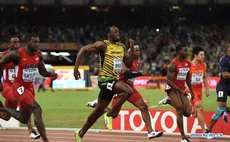Formula one
Despite the inelegance, the term Formula One sticks in my mind, and I hope not to have to apologize grossly to any of our motor racing friends who may see no connection whatsoever between high speed races and Test match cricket. The first match of the latest Ashes series has gone into history as a resounding win for England and has proved about all the pundits wrong. To this extent they may ask us to excuse their blushes under the convenience of the blanket "cricket is a funny game". England did not find much amusement in the outcome- England 430 and 289, Australia 308 and 242, a win by 169 runs in just under four days.
Australia, after their sensational 5-nil hammering of England at the latter's visit Down Under nothing like such a result witnessed at Cardiff could have been remotely expected. The shoe seemed clearly on the wrong foot, the scoreline being more expected to go Australia's way after the emphatic nature of their victories in the warm-up engagements.
Of course, touring sides have bounced back from a reverse in their opener to the Test schedule, citing the need to overcome the messy business of acclimatisation to the fickleness of an English summer. West Indians old enough will remember John Goddard's men putting aside their defeat at Old Trafford to reply with wins at Lords, Trent Bridge and The Oval to make it 3-1 an historic first ever triumph on English soil. We wonder, though, whether it is in the cards for the Aussies to turn the tables on England – at least so soon, I take the risk of writing this three days before the second Test gets underway, constrained as I am under the strictures of a weekly publication.
Cook's winning of the toss was an invitation to bat first and to amass as many runs as possible – the routine requirement of the conservatively sensible approach. Then, with wickets falling at 7 and 42, the opportunity arose for the new men in the team to demonstrate their worth. Gary Ballance held on for 61 and Joe Root made up amply for the loss of Ian Bell at 43 for 3 by constructing 134, perhaps the sure base for the victory which was to follow.
Ben Stokes, 52 and Moeen Ali 77 further emphasised the timeliness of a new emerging middle order willing to take the fight to the opposition at any hint of their tiring with the old ball. The 4th wicket partnership of 153 between Ballance and Root could be deemed pivotal and led the way to 430 all out after 343 for 7 at stumps on the first day. Few sides have suffered defeat after getting past 400 in their opening effort under English conditions.
Pressures of runs on the board became, thus, the major issue for Michael Clarke and his men. In real earnest, could they avoid capitulation? Only Chris Rogers' 95 helped prevent the situation from becoming distinctly dire in face of Steve Smith being stifled for 33 just when he promised to lift his side.
Clarke's failure for 38 - he like Smith falling to the spin of the heavily bearded Moeen Ali - was cause for despondency at 207 for 4 and a total of 308 was all Australia could muster. The lead for England was 122, but more than this it was demonstrated that the English spinners could keep the better players of spin quiet in the relative sense. Smith and Clarke had been nullified significantly.
Much may be said of the Cardiff pitch tailor made for the English bowlers. If anyone complains, least of all should be Australia. Their batting surfaces at home are baked to suit a four man pace attack thriving on encouraging bounciness supported by avid slip fielders. Why shouldn't England prepare slower wickets, if they have the men to use them to advantage? Don't get me wrong. The dusty pitches of the late 1950's immortalised in Jim Laker getting 19 wickets in a single Test are easily categorised as excessive and such blatant dustiness should never be repeated. Still, it is to be wondered where were the Australian spinners!
The presence of several cracks – or fishes, the Australian supporters would prefer to say – at Cardiff might be a weighty indictment against the ground authorities. However, the batting landscape was hardly visually different from that presented on the third day at Sydney or Adelaide!
Grim necessity demanded England to avoid letting their advantage slip and that they guarded against in creditable fashion. Cook and Lyth again failed collectively as the opening pair despite the latter's fighting 37. It stood to Bell getting 60 in proof of his premier rating, as well as Root coming good again with 60 to see the score to 213 for 5 and an overall lead of 335- not an encouraging sign for Australia!
England's eventual dismissal for 289, somewhat precipitate but not inconsistent with the sharpness of spin being encountered, meant that Australia would be faced with a target of 412 amid a welter of probing questions to be answered. Could they overcome the pace of Anderson, Broad, Wood and Stokes or the spin of Ali and Root on the worn surface?
Answers came quickly enough in the span of 70 overs and 3 balls. Warner 52, Smith 33 seeing it to 101 for 3 and a not too familiar scenario for Australia of six players clustered around the bat. The writing was clearly on the wall despite Michael Johnson's 77 flaring up in the closing stages of a fire – but whose embers were merely in the dying stages. Australia's resolve had initially been quelled by the incisiveness of Stuart Broad with 3 for 59 and Mark Wood 2 for 52 with the new ball to pave the way for Ali 3 for 59 and Root 2 for 28 to dismiss Australia for 242.
Has England regained the formula for Ashes success? Or will Australia rebound to emerge from under the cloud of early defeat in this the oldest of international cricket battles "The Ashes"? It is difficult to say at this point. The English weather is yet to have its say by introducing elements of swing of a truly disconcerting variety requiring batsmen to produce diploma styled responses. Here and now early success can count for much. England 1 up. Some series have ended 1-nil with the rest stalemate. England doesn't appear to be overawed by the reputation of their guests. Poignant testimony in cricket favours not the better team but the team which plays better.




